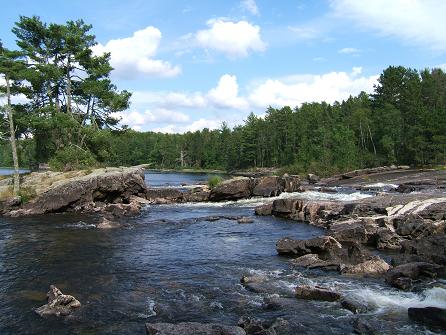Bear country (terrestrial version)

Ah, summer. It's definitely gone now -- soon we will be closer to the winter solstice than to the fall equinox -- but the memories linger. This image comes from the Boundary Waters Canoe Area Wilderness in northern Minnesota. The photographer, Rod Myran, took part in an expedition that included Tom Claeson, Wes Clifton, Kenny Earl, and me. We spent a few nights in early August in the Boundary Waters. We call this spot "The Jacuzzi"; you'll pardon me if I am less than fully forthcoming with its exact coordinates.
And yes, nights in the Boundary Waters are perfect for stargazing. They were made for the celestial wonders that Jurisdynamics is simultaneously praising. The occasional bear in camp or along the trail makes the BWCAW "bear country," in a way vaguely reminiscent of the "bear country" being celebrated on this forum's companion weblog.The Boundary Waters represent an exceptionally enjoyable (and surprisingly accessible) example of federal lands designated as "wilderness" by the Wilderness Act of 1964:
A wilderness, in contrast with those areas where man and his own works dominate the landscape, is hereby recognized as an area where the earth and its community of life are untrammeled by man, where man himself is a visitor who does not remain. An area of wilderness is further defined to mean in this chapter an area of undeveloped Federal land retaining its primeval character and influence, without permanent improvements or human habitation, which is protected and managed so as to preserve its natural conditions and which (1) generally appears to have been affected primarily by the forces of nature, with the imprint of man's work substantially unnoticeable; (2) has outstanding opportunities for solitude or a primitive and unconfined type of recreation; (3) has at least five thousand acres of land or is of sufficient size as to make practicable its preservation and use in an unimpaired condition; and (4) may also contain ecological, geological, or other features of scientific, educational, scenic, or historical value.Proposals to mechanize the BWCAW arise routinely. The mere suggestion of mechanization raises some of the bitterest political and cultural fissures in the law of public lands and natural resources. Put me squarely on the side of wilderness. The footprint of "civilized" humanity extends to the extremes of the earth. It isn't altogether implausible to defend BWCAW preservation on grounds of biodiversity conservation or ecosystem services. An even simpler defense appeals to me as sufficient and complete in itself: Wilderness is worth protecting simply because it is beautiful and because the loss of natural beauty would impoverish human existence.












0 Comments:
Post a Comment
<< Home